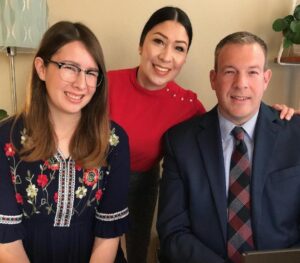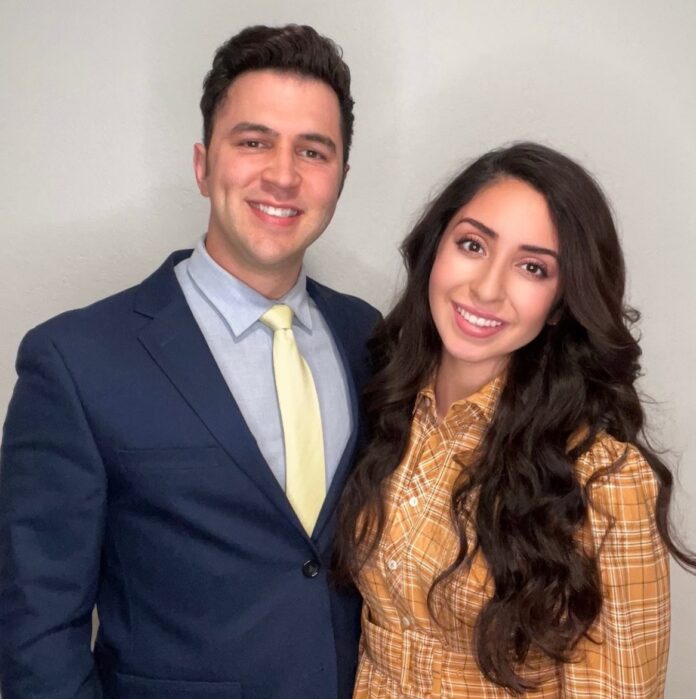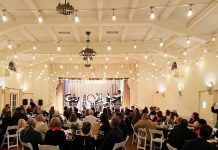Many people have been affected over the course or nearly two years since the beginning of the COVID-19 pandemic. This has proved to be challenging times for Jehovah’s Witnesses as they are now meeting virtually for congregational services and their door to door ministries have come to a halt. But, they adapted, and their ministries are continuing with a virtual platform, using phone calls, writing letters, and the use of Zoom to continue their personal ministries in their own neighborhoods.

Regional elder Konrad Siegel lives in Imperial Beach and attends the Kingdom Hall of Jehovah’s Witnesses Imperial Beach. He personally attends its Spanish version and said that the neighborhood ministry is extremely important to him, his family, and those he gets the opportunity to speak with.
“I received the wonderful hope from the Bible, and that hope is really something that has made my life better,” he said. “Since I have a hope for the future, and I have learned great practical things from the Bible that have helped me in my family life, my desire then is to share that with my neighbors. I want to help my neighbors to have a great life, to be able to pick what they have learned in the Bible and apply it to their lives. To have a family life and to have a hope for the future.”
Siegel said that the ministry is extremely positive and that they not only speak with people who may not know much about the Bible, but also serves to connect with people within the congregation, encouraging one another, reminding them about the hope for the future, and sharing practical points they learn to help have happier families. He said the pandemic has affected everyone in one way or another and that the ministry is an important part of helping people through these challenging times.
“It has affected our in-person meetings, in-person preaching in our public areas,” he said. “You may not find me or any other Witnesses at a preaching cart down in Imperial Beach, or in public areas right now. We are not knocking door to door, but we are still very active in our ministry. We still have our weekly meetings where we meet at a congregation on Zoom. We still study and learn from the Bible, and we also still try to do our best in trying to reach our neighbors by letter writing and telephone witnessing and sharing articles from our website. As far as the future is concerned, we hope that we can keep helping our neighbors as best as we can.”
Siegel said everyone has watched the pandemic come in different waves, going up and down, but that the witnesses are still doing the best they can to share the good news with its neighbors with messages of hope.
“As we talk with our different friends and congregations, we can see that many are having the same experiences as me and my family,” he said. “Even with the pandemic, we keep enjoying our meetings with one another in our different congregations. From what I have seen personally, we are all just keeping on, keeping on. We are preaching to our neighbors. We are trying to help them out. We are encouraging one another, and we keep moving forward through this pandemic. Not just moving forward and staying afloat, but we are all thriving. We are all seeing that we can still worship together, share hope with our neighbors, and keep doing what we can do to help people in our community.”
Joseph and Alejandra Hammer have lived in El Cajon since they were married four years ago at attend the La Mesa Kingdom Hall of Jehovah’s Witnesses. Joseph Hammer works as a mobile phlebotomy technician in East County, providing people that cannot travel with getting their bloodwork done and COVID-19 testing. Alejandra lost her job at the beginning of the pandemic, but began a side photography business, and the couple works together working with videography, mostly wedding and proposal videos.
Joseph Hammer said though the pandemic has put him working 10 to 12 hours a day now, that writing letters, making phone calls has been good for him since he can do this around his schedule and keep up with his personal ministries from home.
“The ministry has been really good,” he said. “As Jehovah’s Witnesses, we are known for knocking on the door, talking to people about the Bible. We do that because we love people. With COVID, we are not going door to door, and that has been a big adjustment. But that was not going to stop us from being able to talk to people about the Bible. You may not see us on the streets right now, but we are still very much talking to people on the phone, writing letters, and that has been a totally new experience. I have enjoyed having to share as much as possible in the ministry. To share any positive thoughts from the Bible as possible.”
Joseph Hammer said many times in neighborhood ministry they do not find people at home, or they may live in a gated community, so with the letter writing and phone calls, it is the first time that people are introduced to Jehovah’s Witnesses with the use of letters and phone calls.
“The response is different,” he said. “When you see them in person, you talk right then and there and share thoughts. Writing letters, we may not get a response. We just hope people are opening that letter and getting encouraged about it. The response is more positive. People are just lonely right now.”
Alejandra Hammer said she does a lot of home letter writing, working with other neighborhood witnesses through Zoom, and through the pandemic it helps her not feel so isolated.
“Everyone is stressed out, worried about the future, financial stress, because of the pandemic,” she said. “I feel that the response now has been much more positive. Many people are isolated and taking this time to reflect on themselves. Look for answers to questions that they have had.”
Siegel said that it may not appear as easy because witnesses are not as accessible as before the pandemic, but that they are just a phone call or a letter away, still working hard to spread hope. He said the Jehovah’s Witnesses website at jw.org has become a powerful tool for witnesses to utilize in their personal ministries, as it has many videos, articles, teachings, and give people the opportunity to find a Kingdom Hall near them and for now, attend virtually.
Because the San Diego region is extremely diverse with many distinct cultures, backgrounds and languages, the website is translated in more than 1,000 languages, the Bible is translated in full in more than 200 languages, so that every single person in the community has access to its teachings.
In the past, neighborhood ministries would go in groups, in car groups of five to seven, go into a neighborhood and knock on doors. Now they work together through Zoom. continuing ministry activities, such as letter writing and phone witnessing as they break out into rooms and work on that part of ministry in smaller groups.
For more information visit www.jw.org.
The original version of this story incorrectly spelled the name of Konrad Siegal. The article has been changed to reflect the correct spelling of Konrad Siegel. The East County Californian regrets the errors.














